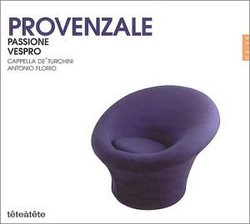| All Artists: Anonymous, Francesco Provenzale, Giovanni Salvatore, Giovanni Carlo Cailo, Francesco Rossi, Giuseppe Tricarico, Giuseppe Giamberti, Cristofaro Caresana, Antonio Florio, Capella de 'Turchini Title: Provenzale: Passione; Vespro Members Wishing: 0 Total Copies: 0 Label: Opus 111 Release Date: 11/12/2002 Album Type: Original recording reissued Genres: Special Interest, Classical Styles: Opera & Classical Vocal, Chamber Music, Historical Periods, Baroque (c.1600-1750), Classical (c.1770-1830), Sacred & Religious Number of Discs: 2 SwapaCD Credits: 2 UPC: 709861200061 |
Search - Anonymous, Francesco Provenzale, Giovanni Salvatore :: Provenzale: Passione; Vespro
 | Anonymous, Francesco Provenzale, Giovanni Salvatore Provenzale: Passione; Vespro Genres: Special Interest, Classical |
Larger Image |
CD Details |
CD ReviewsA Dozen Monteverdis? Giordano Bruno | Wherever I am, I am. | 07/02/2009 (5 out of 5 stars) "Much as I revere the composer Claudio Monteverdi (1567-1643), whom I regard as the epitome of musical genius, his preeminence is at least partly an artifact of modern musicology. Monteverdi's music - his madrigals, villanellaas and ritornellos, his masses, and especially his glorious Marina Vespers of 1610 - were all composed in a shared idiom of Italian musicians of his era; Monteverdi's greatness is not his innovation but his felicity. Even his operas were not as sui generis as the modern stagings might suggest, and his greatest opera, L'incoronazione di Poppea, was almost certainly partly the work of Francisco Cavalli. So I suggest that you browse through the names of the following dozen contemporaries of Monteverdi, each of whom wrote at least some music worthy of being heard alongside the best of Claudio himself:
1) Francisco Cavalli 2) Stefano Landi 3) Michelangelo Rossi 4) Sigismundo d'India 5) Chiara Margarita Cozzolani 6) Barbara Strozzi 7) Emilio de'Cavalieri 8) Giovanni Rovetta 9) Virgilio Mazzochi 10) Giovanni Salvatore 11) Francesco Provenzale 12) Cristofaro Caresana The last three were Neapolitans, who made very prosperous careers for themselves in Naples, which was in the 17th Century one of the largest and richest cities of all Europe. They didn't need to go to Vienna or Paris, or even Rome; they were musical "capi" at home. And they had both ample public appreciation and ample musical resources of singers and instrumentalists to accomplish their highest musical goals. That they have been forgotten and neglected, and overshadowed by Monteverdi, says nothing about their musical brilliance. These two CDs were recorded in 1996 and 1998; thank goodness they've been re-released. The singers include several who have become well-known in the meantime - especially sopranos Roberta Invernizzi and Emanuela Galli - from their madrigal recordings with ensembles like La Venexiana and Concerto Italiano. Invernizzi is showcased in Provenzale's virtuosic 20-minute Beatus Vir on the 2nd CD. The continuo and obbligato instrumentalists of Cappella de'Turchini, based in modern Naples, play at the acme of elegance in this flamboyant, exuberant Baroque 'music of popular devotion'. You might want to pay special attention to the bassoon, both obbligato and continuo, on the second disk. If you really really really like those Monteverdi Vespers, take my word for it, you'll find these two recordings, especially the second, extremely enjoyable." |
